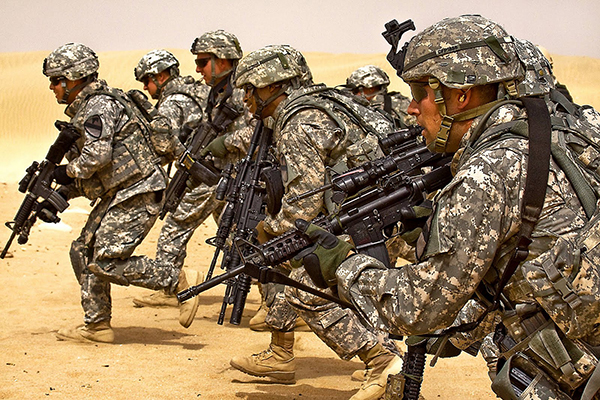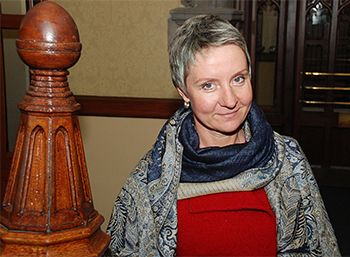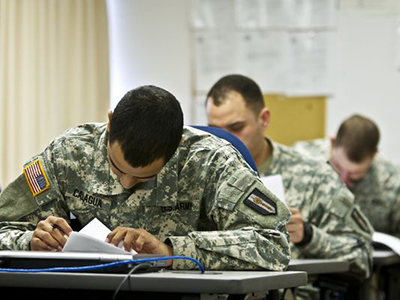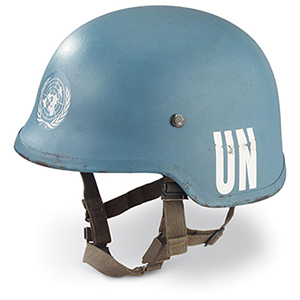Personality tests would make the military more effective

Tue, 23 Jun 2015 14:50:00 BST
Researcher Dr Merle Parmak argues that military personality tests should be used to determine whether recruits are suitable for combat or better fitted to roles behind the lines
 ARMIES would be more efficient and effective if they used personality tests to decide whether recruits are suitable for combat or better fitted to roles behind the lines. This is the conclusion of a University of Huddersfield psychology lecturer and researcher who has held military rank and spent time in battle zones. Her arguments have come to the attention of NATO ACT (Allied Command Transformation).
ARMIES would be more efficient and effective if they used personality tests to decide whether recruits are suitable for combat or better fitted to roles behind the lines. This is the conclusion of a University of Huddersfield psychology lecturer and researcher who has held military rank and spent time in battle zones. Her arguments have come to the attention of NATO ACT (Allied Command Transformation).
Estonian-born Dr Merle Parmak (pictured right) has analysed the differing personality types to be found among military personnel. High sensation seekers are less likely to be afraid in combat because they have a relatively low perception of threat and treat it as a challenge. Low sensation seekers have much higher perception of threat and could fail in combat.
Another trait analysed by Dr Parmak is “structure seeking”. A low sensation seeker with a liking for structure will be highly effective in a staff or office role. However, even in combat there is a need for good organisation, therefore the most effective fighting soldier will be a high sensation seeker who is also comfortable with structure.
Sophisticated psychological tests have been developed to analyse attitudes towards sensation and structure. The basis of Dr Parmak’s work – in her PhD thesis, in a sequence of academic articles and a briefing note titled Personality assessment and military selection, presented to a NATO Operations Medical Conference – is that these tests should be used to decide the ideal deployment for recruits.
 She describes this as an “interactional approach” and hopes that it will become military orthodoxy. It has been challenged on grounds of expense, but Dr Parmak argues that it would bring about enormous increases in military efficiency by ensuring that recruits were allotted to their most suitable roles.
She describes this as an “interactional approach” and hopes that it will become military orthodoxy. It has been challenged on grounds of expense, but Dr Parmak argues that it would bring about enormous increases in military efficiency by ensuring that recruits were allotted to their most suitable roles.
“In the modern military environment, there is a very wide range of occupations and we are performing badly if we simply take a recruit and fill an empty slot without first testing the person and assigning duties that are suitable for that profile,” she says.
Allotment of roles
Dr Parmak does not accept that the issue is simply a question of cowardice and courage.
“If you take a structure seeker and you put him in a very high risk situation, he may seem to behave as a coward because he cannot tolerate risks. If you take a sensation seeker and put him into an office environment then he will get equally stressed because he hates the boredom.”
The nature of army recruitment campaigns influences the psychological profile of recruits, says Dr Parmak.
 “If we are emphasising the macho stuff so that armed forces are advertising themselves as a place for adventure, then that will result in more sensation seekers. But if the forces advertise themselves as peace-keeping organisations – like the UN blue helmets – then they get more structure seekers.”
“If we are emphasising the macho stuff so that armed forces are advertising themselves as a place for adventure, then that will result in more sensation seekers. But if the forces advertise themselves as peace-keeping organisations – like the UN blue helmets – then they get more structure seekers.”
Careful allotment of roles according to psychological suitability would not lessen an army’s combat capability, argues Dr Parmak.
“Not all combat roles are action roles,” she says. “Afghanistan was the most combat-like recent deployment, but even here there were roles where the level of risk was not very high.”
Research into the military
Dr Parmak has conducted research in Afghanistan and other combat zones, including Bosnia, and she holds the rank of Captain (Retired), from her period in uniform as a research psychologist at the Estonian Defence College.
Her engagement with the military began in the 1990s and the period of the collapse of the Soviet Union, when she served with the logistics department of the Estonian Defence League. When she later went on to study psychology, her exposure to the military provided her with the basis for research that has seen her carry out international collaboration in several NATO STO (Science and Technology Organisation) Human Factors and Medicine Panel research task groups, and resulted in several co-authored books and articles, including Personality and the perception of situation structure in a military environment: seeking sensation versus structure as a soldier in the Journal of Applied Social Psychology.
Before relocating to the UK, she was a research fellow for the Institute of Industrial Psychology at Tallinn University of Technology in Estonia. At the University of Huddersfield, she lectures in occupational and organisational psychology and aims to continue with her research into the military.







